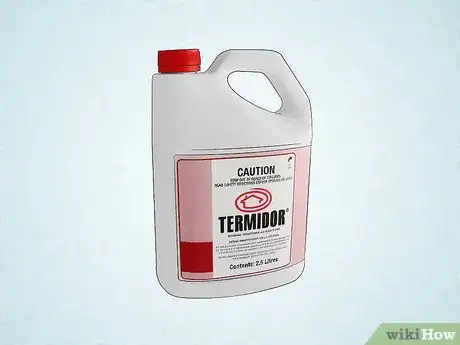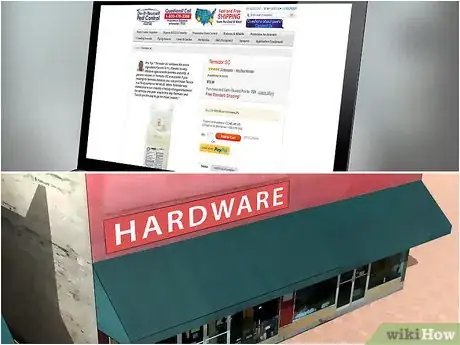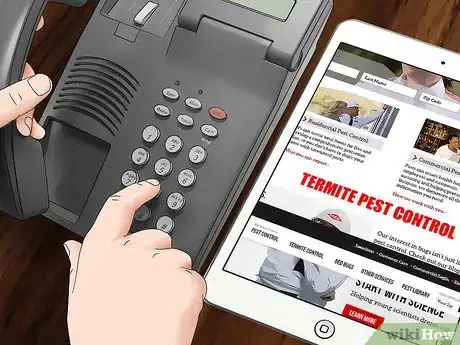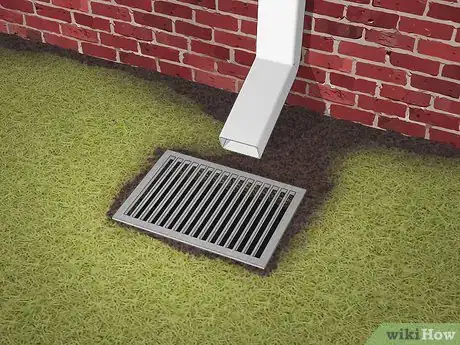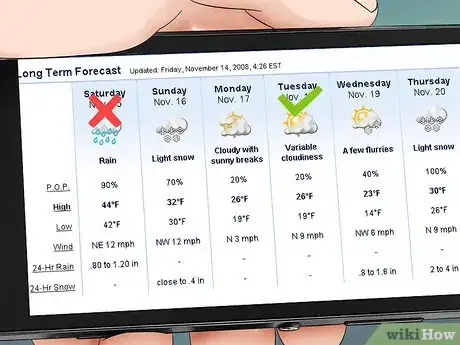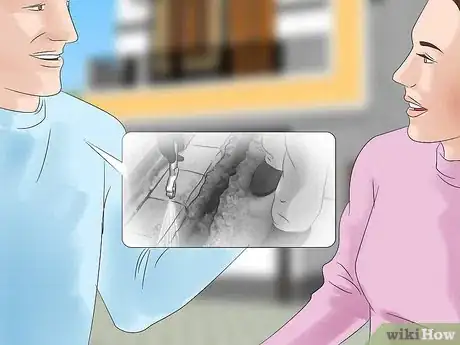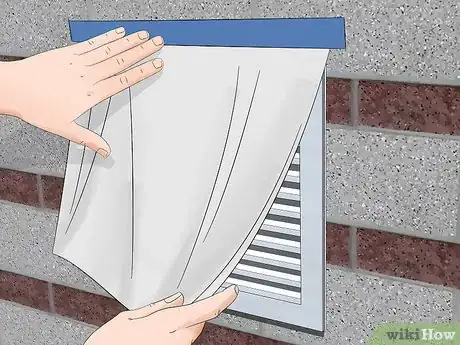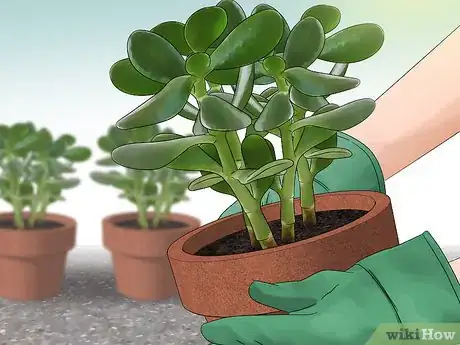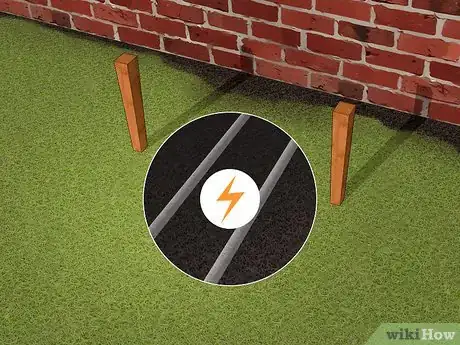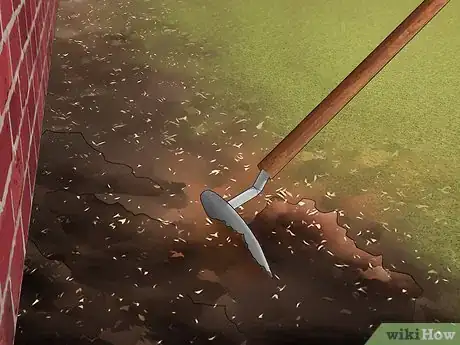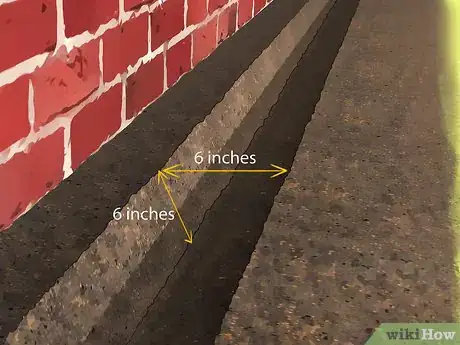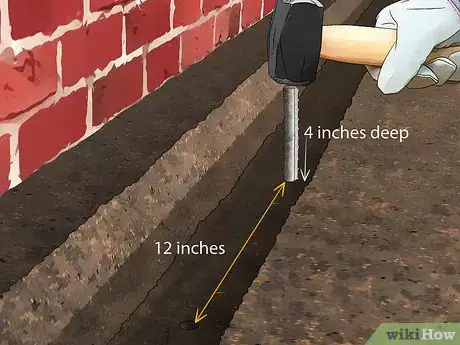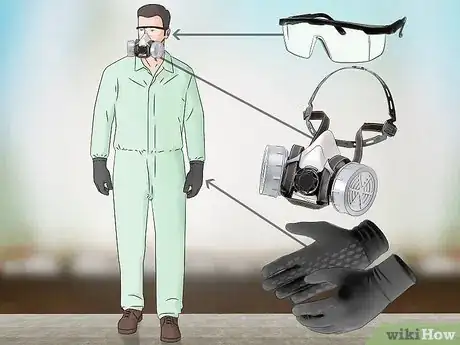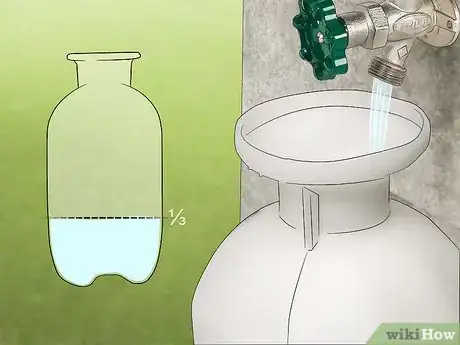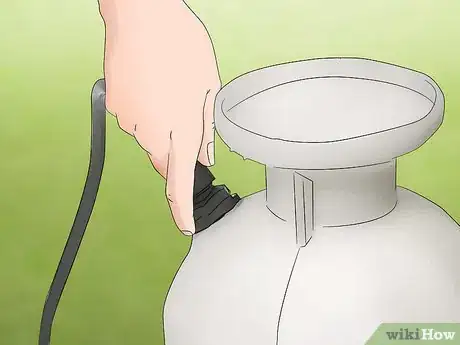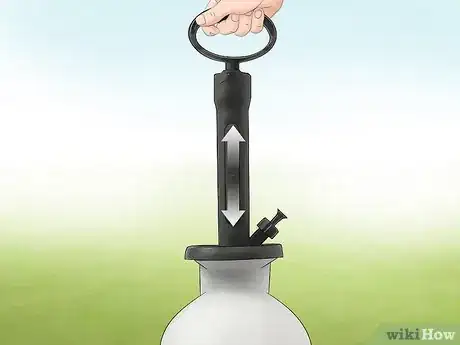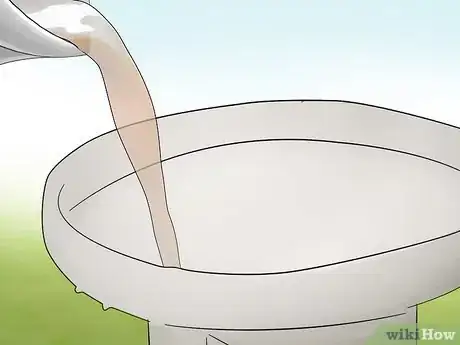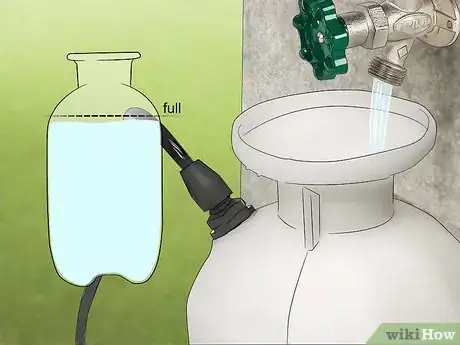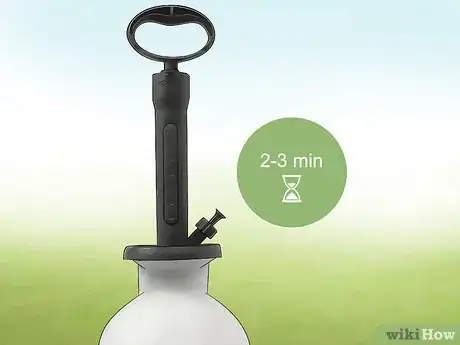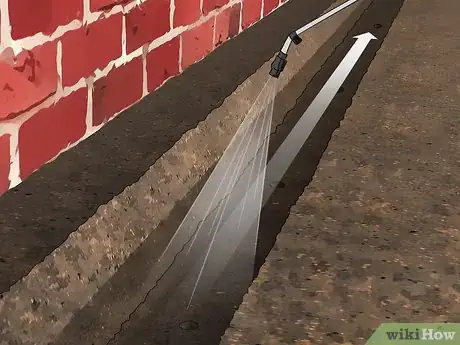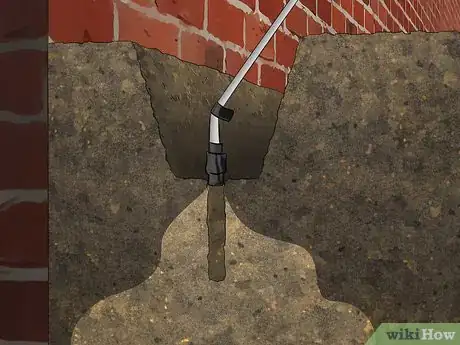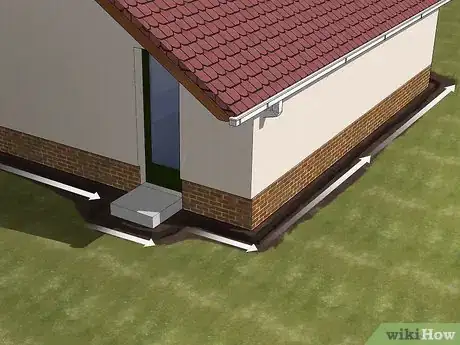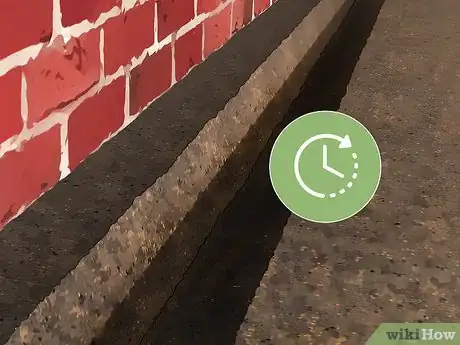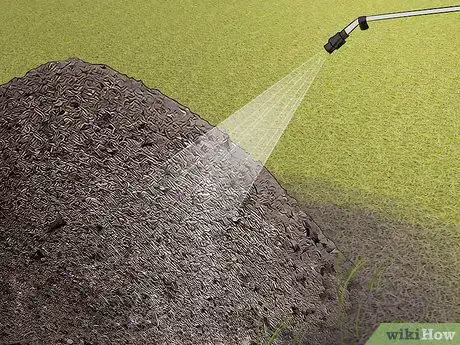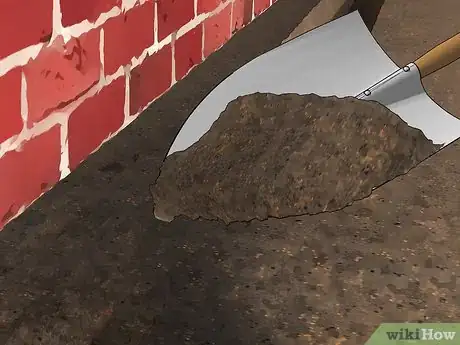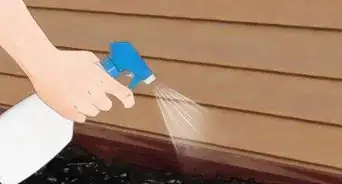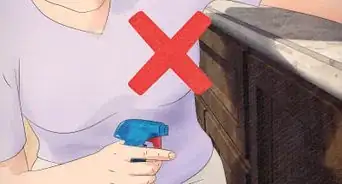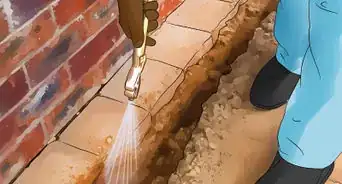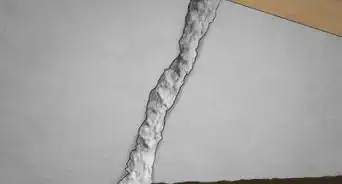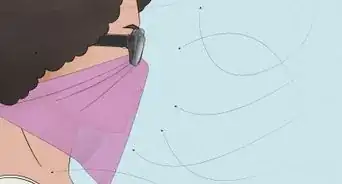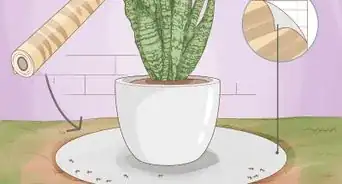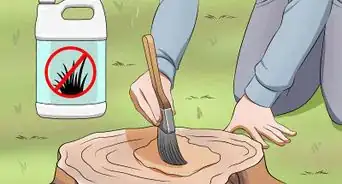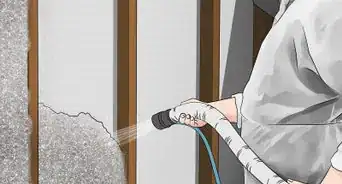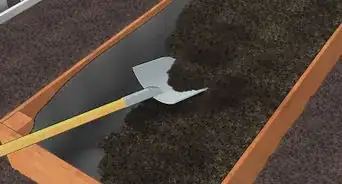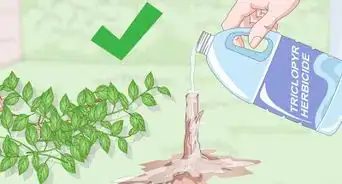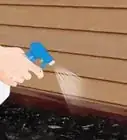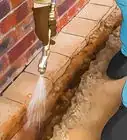This article was co-authored by wikiHow staff writer, Danielle Blinka, MA, MPA. Danielle Blinka is a Writer, Editor, Podcaster, Improv Performer, and Artist currently living in Houston, TX. She also has experience teaching English and writing to others. Danielle holds a Bachelor of Arts in English, Bachelor of Arts in Political Science, Master of Arts in English with a concentration in writing, and Master of Public Administration from Lamar University.
There are 9 references cited in this article, which can be found at the bottom of the page.
This article has been viewed 157,337 times.
Learn more...
Dealing with termites in your home is very stressful, so you likely want to treat them as quickly as possible. Fortunately, you can rid your home of termites using Termidor SC, which is a pesticide that kills termites. Most people can purchase Termidor SC online, and it’s at local hardware stores in some areas. To apply Termidor, you'll need to dig a trench around the base of your home, which you will fill with the pesticide.
Steps
Purchasing Termidor
-
1Check if Termidor is available for sale in your area. In some regions, Termidor is only sold to pest control professionals who are Termidor Certified. These individuals are trained in how to effectively use this pesticide without risking harm to people, pets or the environment. However, it is available for sale online in some areas, and you may be able to get it shipped to you. Additionally, it's sold in some hardware stores in places without restrictions.[1]
- Although it's sold online, stores usually won't ship to regions where it's not legal to purchase Termidor without a certification.
- Keep in mind that termites are very difficult to treat on your own. If you miss just one spot, your termite shield will be ineffective. Hiring a trained professional is the best way to ensure a successful treatment.[2]
-
2Order Termidor online or purchase it from a hardware store, if it's available. Buy the amount recommended for your home's square footage. You'll need to treat the entire perimeter of your home, even if you only have termites in one small area.[3]
- If you only treat a small area around your home, the termites will just move to the untreated area.
- You'll also need a pesticide sprayer in order to apply the Termidor around your home.
- You can purchase Termidor for under $100, if it's sold in your area.
Advertisement -
3Hire a Termidor Certified professional if Termidor is unavailable to you. Use the zip code locator on Termidor’s website to find a professional in your area.[4] Research the professional to check their service record and look for complaints. Get at least 3 different quotes, if possible, to help you identify the best value.[5] Ask your professional for a pest control plan in writing, which includes how many treatments are included in the price. Many plans cover a 1-2 year period, since termites are hard to eradicate.
- You can find the zip code locator here: https://www.termidorhome.com/. If you live outside the United States, you’ll need to do an online search for pest control professionals in your area.
- Make sure they are licensed to operate in your area, and check that they’re a member of local or national pest control associations. Additionally, read reviews from prior customers.[6]
Securing the Area
-
1Prevent the product from entering nearby waterways. This includes drains, wells, ponds, streams, rivers, and other water sources. Termidor SC is toxic to humans, fish, and other wildlife, so you don’t want it tainting the water.[7]
- Never apply this product near an area you know will runoff into a waterway. Remember, you can’t get it out of the water once it’s gone into it. If you’re in doubt, call in a professional.
-
2Check the weather forecast to make sure no rain is expected within 48 hours. Rain will wash away the Termidor SC, reducing its effectiveness. Additionally, this may cause the product to contaminate nearby waterways. However, allowing 48 hours for the product to dry will ensure it stays in place.[8]
- Do your best to apply the Termidor SC on a clear day, if you can.
-
3Keep any family members, roommates, or pets out of the home for 1-2 hours. The fumes from the pesticide can be toxic in high doses, so you want to allow the area time to ventilate. Although this may not always be necessary, it’s better to keep your family and pets safe.[9]
- Since you’re applying the treatment outdoors, you don’t need to open windows or doors to ventilate the inside of your home.
-
4Warn your neighbors that you will be using a pesticide. They may prefer to leave the premises or secure their pets away from the area. This is especially important if anyone has a pet that typically roams around your home, as it may inadvertently come into contact with the pesticide.[10]
- Say, “I’m going to be applying a pesticide to kill termites around my home. It’s considered safe for use around humans and pets, but I wanted to let you know so you can avoid the area for a few hours.”
-
5Use plastic sheeting to cover your exterior air conditioning ducts, vents, and drains. Use painter’s tape to secure the plastic sheeting around the ducts, vents, or drains. Make sure there are no gaps around the plastic, so that there is no leakage. This prevents the Termidor from getting into your home.[11]
- Cover the vents on the outside of your home, since that's where you'll be applying the Termidor. You don't want it to come into your home through the vents.
- Turn off your air conditioner or heating system while your vents are covered.
-
6Tent or remove edible plants so they don’t get contaminated. If you get the Termidor on your plants, they will be toxic for consumption. If you can, remove the plants from the area while you apply the pesticide. However, you can cover them with a plastic sheet if this is not an option. Use a stick or rod to tent the plastic sheeting so that it doesn’t crush the plant.[12]
- You should still wash the part of the plant you eat before consuming it.
-
7Mark the location of electrical lines, sewer lines, and plumbing and heating pipes. It’s important that you don’t make contact with any electrical lines, as this can result in injury or death. Similarly, don’t risk puncturing sewer lines, plumbing pipes, or heating pipes. This can be both dangerous and unpleasant.[13]
- You may need to call out your local authorities to mark them for you.
-
8Use a hoe to loosen the soil around the perimeter of your home, if necessary. Break up the soil that’s directly beside your home’s foundation. This will keep the Termidor SC from flowing away from the treatment area. Hard-packed soil is hard for the treatment to penetrate, so it will not soak in as well.[14]
- If you don’t have a hoe, you can use a shovel or spade.
-
9Dig a 6 in (15 cm) wide and 6 in (15 cm) deep trench around the base of your home. Use a shovel to make your trench and follow the entire perimeter of your home. The trench allows the Termidor to penetrate below the soil, killing the subterranean termites. Additionally, it prevents the product from flowing away from the treatment area.[15]
- Trenches are necessary and effective whether your house is built on a slab or on blocks. For a home built on a slab, the trench will run alongside the slab. If your home is on blocks, the trench will run in front of the blocks.
-
10Hammer rods about 4 in (10 cm) into the trench, spaced 12 in (30 cm) apart. Using rods is optional but will allow the Termidor to reach even further into the ground, providing extra protection. You can use any metal stake or rebar for your rods. Remove the rods after you create a hole.[16]
- Remember not to hit any pipes or sewer lines.
- Pest control professionals use rodding to help the product work more effectively, but not all homeowners will use it.
Mixing the Termidor
-
1Put on personal protective gear before handling and applying Termidor. This includes a washable hat, protective eyewear, a face mask, thick work gloves, a long sleeved shirt, long pants, and close-toed shoes.[17]
- It’s best to wear a half-facepiece respirator with a combined dust and gas cartridge, as this provides the best protection against breathing in the fumes.
-
2Fill about ⅓ of your sprayer tank with water. You don’t need to worry about how much water you’re putting in. As long as you know the size of your tank, you’ll be able to create the right mixture by measuring out your Termidor.[18]
- Use your water hose or a bucket to fill the tank.
- You'll need to purchase a pesticide sprayer separately from the Termidor. Choose a model that comes with a pump and applicator.
- If you don't have a sprayer, you can use a 5 US gal (19 L) bucket to mix and apply the Termidor. However, application won't be as easy and may not be even. Additionally, it's best to use a sprayer to treat the soil you took out of your trench.[19]
-
3Attach the applicator tube to the tank. Follow the instructions for your sprayer to make sure the applicator is securely attached. As you mix your solution, the sprayer pump will prime your applicator tube by cycling the solution through it.[20]
- This is the part that sprays the solution.
-
4Start the pump to begin agitating the water. Follow the instructions for your particular model. You should see the water rippling due to the pumping action. Once you add the Termidor SC, it will start mixing with the water.[21]
- If you’re not sure how to turn on your pump, check the instruction manual.
-
5Add the correct amount of Termidor SC, as directed on the label. Measure out the Termidor SC and put it into the sprayer tank. The pump will mix the solution for you, so don’t try to shake or stir it.[22]
-
6Fill the rest of the tank with water. Use your water hose or bucket to add water until it reaches the fill line on your sprayer model. Don’t overflow the tank, as this may spill the pesticide solution onto ground that’s not being treated.[23]
-
7Wait 2-3 minutes for the Termidor SC to dissolve. Then, your solution will be ready for use. Leave the pump on as you use the sprayer so that the solution remains mixed.[24]
Spraying the Termidor
-
1Spray the Termidor into the trench you dug around your home. Saturate the soil and allow the solution to puddle in the trench. It’s better to apply a little more solution than necessary, as it will soak into the soil around your home. Since termites are likely living in the soil around your home, this is necessary to kill them.[25]
- For best results, apply about 4 gallons (15 L) of Termidor for every 10 feet (3.0 m) of the length of your trench. However, your soil may not accept this much pesticide, so you can apply less if necessary.
- Stop spraying if the pesticide starts to runoff.
-
2Pour about 4 gallons (15 L) of the Termidor solution into each rod hole, if applicable. Use the markings on your sprayer to determine how much solution you are applying. The Termidor will soak into the ground around the holes and kill the termites.[26]
- The holes allow the product to penetrate deeper into the ground.
-
3Treat the entire perimeter of your home. Walk slowly as you treat the entire length of each side of your home. It doesn’t matter if you’ve only seen the termites in one area. You still need to treat the entire home. If you leave any spots untreated, the termites will just move there and resume damaging your home.[27]
Finishing Your Application
-
1Check that the Termidor has soaked into the trench before you fill it up. In most cases, you'll notice that the pesticide has soaked into the ground at your starting spot once you've worked your way around your home. If it hasn't, give it more time to dissipate. Monitor the area until there's no more standing liquid in the trench.[28]
- This ensures that the Termidor goes as far into the ground as possible. If you add soil back into the trench before it soaks into the ground, the added soil will soak up some of the pesticide.
-
2Spray the Termidor on the soil you dug out of the trench. Use long, even strokes to wet the soil with the pesticide. This ensures that termites will make contact with the treatment. If you don't treat this soil, termites that stay on the surface of the ground won't die.[29]
- Use a sprayer to treat this soil. If you use a bucket, it will be too hard to control the application.
- If you can, ask someone to help you refill the trench. It's faster and easier to accomplish this if one person is treating the soil and the other person is putting it back into the trench.
-
3Refill your trench with the treated soil. Use your shovel to push the soil back into the trench. Work your way around your entire home until the trench is completely filled in with soil.[30]
- If you don't have a shovel, you can use a garden hoe to refill the trench.
Community Q&A
-
QuestionDoes it harm flowers and shrubs?
 Community AnswerNo, but it can harm things that come into contact with flowers and shrubs like honey bees. Follow the instructions on the label carefully.
Community AnswerNo, but it can harm things that come into contact with flowers and shrubs like honey bees. Follow the instructions on the label carefully. -
QuestionCan termidor residual termiticide and insecticide be used in or around potted plants for other insects?
 Community AnswerIt can be effective for a variety of pests, including most ants. Abide by the label and apply accordingly.
Community AnswerIt can be effective for a variety of pests, including most ants. Abide by the label and apply accordingly. -
QuestionCan I pour termidor inside the trunk of a live tree?
 Community AnswerYes.
Community AnswerYes.
Warnings
- In some areas, you must be a licensed pest control professional with a Termidor Certification to use this product. If this is the case in your area, you’ll need to hire a professional to apply this treatment.[33]⧼thumbs_response⧽
- Keep children away from Termidor SC and the areas you treated with the product. Although Termidor SC is generally safe, children will be more sensitive to its effects.⧼thumbs_response⧽
- Use Termidor only as outlined on the label. Otherwise, the product can become hazardous to humans or the environment.⧼thumbs_response⧽
References
- ↑ https://www.termidorhome.com/Termidor/TermidorforTermitesFAQ
- ↑ https://entomology.ca.uky.edu/ef604
- ↑ https://entomology.ca.uky.edu/ef604
- ↑ https://www.termidorhome.com/Termidor/TermidorforTermitesFAQ
- ↑ https://entomology.ca.uky.edu/ef604
- ↑ https://entomology.ca.uky.edu/ef604
- ↑ https://www.ipmpost.net/includes/pesticide.ashx?f=(dir)/433/Label/termidor_label.pdf
- ↑ https://www.ipmpost.net/includes/pesticide.ashx?f=(dir)/433/Label/termidor_label.pdf
- ↑ https://citybugs.tamu.edu/factsheets/household/termites/ent-2002/
- ↑ https://citybugs.tamu.edu/factsheets/household/termites/ent-2002/
- ↑ https://www.ipmpost.net/includes/pesticide.ashx?f=(dir)/433/Label/termidor_label.pdf
- ↑ https://www.ipmpost.net/includes/pesticide.ashx?f=(dir)/433/Label/termidor_label.pdf
- ↑ https://www.ipmpost.net/includes/pesticide.ashx?f=(dir)/433/Label/termidor_label.pdf
- ↑ https://www.ipmpost.net/includes/pesticide.ashx?f=(dir)/433/Label/termidor_label.pdf
- ↑ https://www.youtube.com/watch?v=va3cSc1M3Nw&feature=youtu.be&t=34
- ↑ https://www.ncagr.gov/SPCAP/structural/pubs/preconstruction.htm
- ↑ https://www.ipmpost.net/includes/pesticide.ashx?f=(dir)/433/Label/termidor_label.pdf
- ↑ https://www.ipmpost.net/includes/pesticide.ashx?f=(dir)/433/Label/termidor_label.pdf
- ↑ https://www.youtube.com/watch?v=yYnrcfz9E30&feature=youtu.be&t=63
- ↑ https://www.ipmpost.net/includes/pesticide.ashx?f=(dir)/433/Label/termidor_label.pdf
- ↑ https://www.ipmpost.net/includes/pesticide.ashx?f=(dir)/433/Label/termidor_label.pdf
- ↑ https://www.ipmpost.net/includes/pesticide.ashx?f=(dir)/433/Label/termidor_label.pdf
- ↑ https://www.ipmpost.net/includes/pesticide.ashx?f=(dir)/433/Label/termidor_label.pdf
- ↑ https://www.ipmpost.net/includes/pesticide.ashx?f=(dir)/433/Label/termidor_label.pdf
- ↑ https://www.ipmpost.net/includes/pesticide.ashx?f=(dir)/433/Label/termidor_label.pdf
- ↑ https://www.ipmpost.net/includes/pesticide.ashx?f=(dir)/433/Label/termidor_label.pdf
- ↑ https://www.ipmpost.net/includes/pesticide.ashx?f=(dir)/433/Label/termidor_label.pdf
- ↑ https://www.youtube.com/watch?v=yYnrcfz9E30&feature=youtu.be&t=99
- ↑ https://www.youtube.com/watch?v=yYnrcfz9E30&feature=youtu.be&t=99
- ↑ https://www.youtube.com/watch?v=yYnrcfz9E30&feature=youtu.be&t=99
- ↑ https://entomology.ca.uky.edu/ef604
- ↑ http://npic.orst.edu/factsheets/fipronil.html
- ↑ https://www.termidorhome.com/Termidor/TermidorforTermitesFAQ
About This Article
Termidor is a great product for getting rid of termites, but you’ll need to be careful when applying it, since it’s toxic to humans and animals. Wait until you’ll have 2 days without rain so it doesn’t wash away, and get everyone out of your house for a couple of hours. Cover any vents outside, and remove any edible plants from the area. Loosen the soil around the perimeter of your house with a hoe or shovel, and dig a trench 6 inches wide and deep all around. However, don’t apply Termidor near any drains or waterways so it doesn’t get into the water supply. Mix Termidor with water in your sprayer tank according to the label. Then, spray it into the trench and on the soil you removed. Once the Termidor has soaked in, return the soil to the trench. Don’t forget to wear protective gloves, goggles, and a respirator. For more tips, including how to avoid electrical and water lines, read on.
